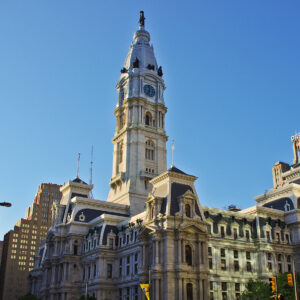Benjamin Franklin, arguably Philadelphia’s most famous resident, reportedly once urged his contemporaries: “Work as if you were to live a hundred years.”
Philadelphia apparently didn’t get the message.
A new WalletHub survey of the “best large cities to start a business” ranked Philadelphia 85th among the 100 cities reviewed. That places it below cities such as Chesapeake, Va., Omaha, Nashville, and Henderson, Nev.
David Oh, an attorney and former Republican city councilman now running for mayor, said of the city’s entrepreneurs, “Those who can leave, leave.”
“Those who can start their businesses elsewhere,” he said. “And so we have that reduction. But with the vilification of entrepreneurs, which has happened over the last few years, our communities are actually electing people who vilify small business, big business, (and) landlords.”
City leaders “vilify businesses and help, you know, make things very difficult for business owners,” said Oh. “Lots of regulations that are unnecessary, penalties and things like that.”
Neither Mayor Jim Kenney nor Gov. Josh Shapiro responded to requests for comment. Shapiro campaigned in part on bringing new jobs to the state.
Kathryn Elliott, a professor of the practice of entrepreneurship and director of the Center of Entrepreneurship at High Point University, said state and local authorities “can stimulate business growth by creating a safe yet more small business-friendly legal environment, investing in the business and entrepreneurial training, reduction of bureaucratic red tape, and lastly encouraging networking collaboratively amongst businesses and investors locally and statewide.”
Oh said residents “can’t buy a soda without paying a tax in Philadelphia” (though, he claimed, heroin is easily accessible). He said the city is levying “more and more taxes” on those who have stayed behind.
“It falls upon the poor because they hear the rich are going to pay for it, but they end up paying for it. And it creates a big problem.
“I, for example, introduced bills to try to level the playing field to bring employers, large employers, to Philadelphia. My colleagues (on city council) don’t support it because that’s tainted as corporate welfare, whereas these employers go to other places because it’s more competitive.”
Michael Omansky, associate professor at the School of Business at Felician University, agreed that cities need to reduce taxes.
“They need to keep their fees down, as well as taxes at lower revenue levels,” he said. Also, officials should offer incentives for job creation and “not get in the way of the entrepreneur,” he argued.
Oh said that the city’s considerable number of taxes—a “wage tax,” a “gross receipts tax,” and others—have produced very little value relative to their cost.
“The schools, the education system, is doing very poorly,” said Oh. “So your base workforce is having a problem in terms of when you try to recruit employers here. We have a wonderful college and university system, so that’s not a problem.”
“But overall, it’s the instability of Philadelphia,” he said. “The taxes are unstable, and the business climate is unpredictable.”
The number one city choice for entrepreneurs, according to WalletHub, is Orlando, Florida, a state led by Republican Gov. Ron DeSantis. In fact, the top four slots went to Florida towns: Jacksonville, Miami, and Tampa, followed Orlando.
Pennsylvania’s second-largest city, Pittsburgh, came in at 96.
WalletHub’s methodology included business environments, resource access, and business costs. The analysis did not include the suburbs of the surveyed cities.
The website also used 19 metrics and gave those “weighted” importance. They included the population’s education level, taxes, capital availability, and office space cost.
Please follow DVJournal on social media: Twitter@DVJournal or Facebook.com/DelawareValleyJournal

